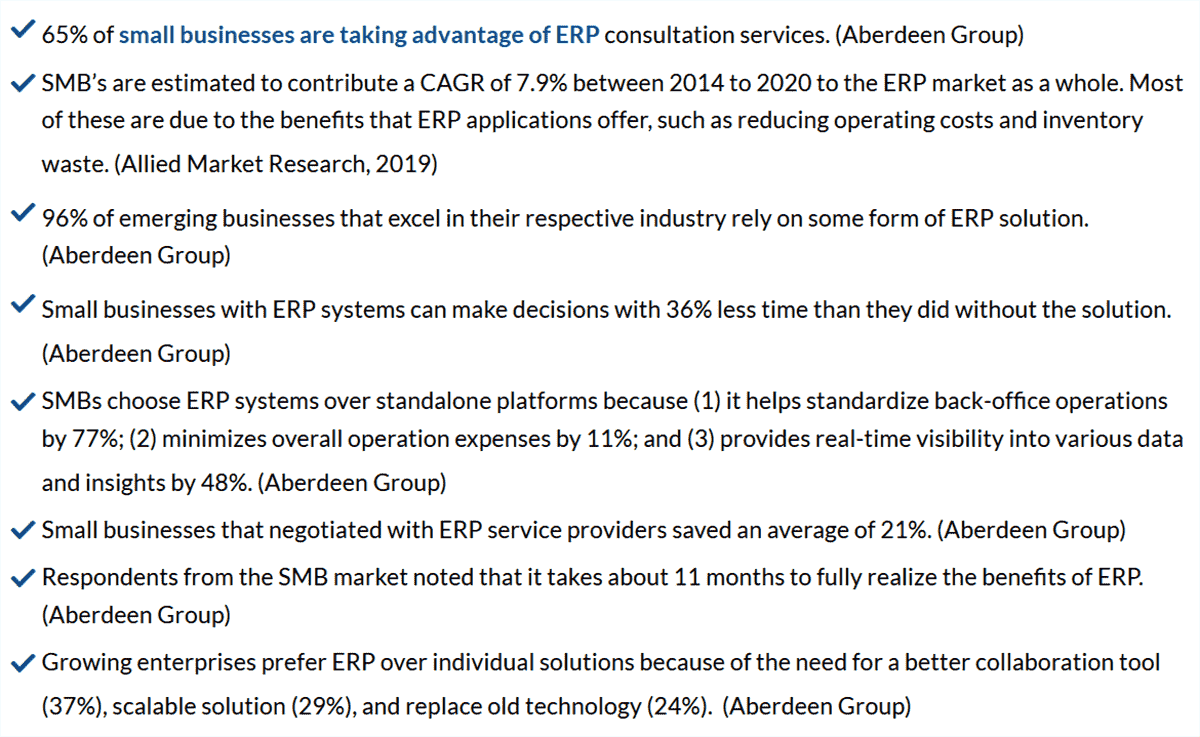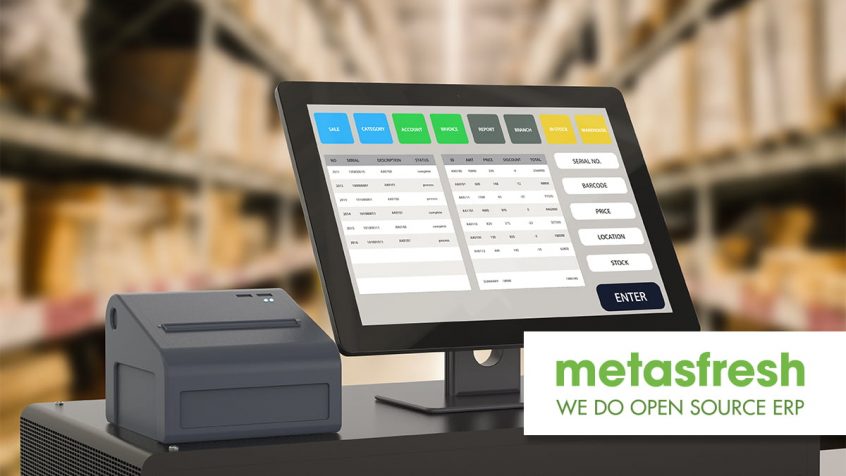Share this Post
Business leaders today understand the huge value of integrated business processes. That’s why, indeed, more and more SMEs are relying on modern, powerful enterprise resource planning (ERP) systems like metasfresh ERP.
ERPs are designed to improve business management and increase productivity. Combining the whole of an enterprise’s back-end business processes — finance, accounting, purchasing, inventory management, supply chain management, human resources, and more — under one overarching system, ERPs allow businesses to attain granular control and visibility over their entire operations. As a result, they can process orders quicker, move products faster, manage inventory and people more efficiently, and handle finance and accounting more effectively.
What’s more, because data from all departments is tightly integrated and easily accessible throughout the organisation, business leaders have better business intelligence — which means they can make better business decisions more promptly.
It’s little wonder, then, that 96% of emerging businesses that excel in their respective industry rely on some form of ERP solution, according to figures from the Aberdeen Group. The research found that SMEs choose ERP systems over standalone platforms because they help standardise back-office operations, minimise overall operation expenses, improve real-time visibility into the status of all processes, and improve the business’s ability to forecast and plan for demand.

ERP Adoption in Small Business Statistics. —Source: financesonline.com
Even so, despite the huge adoption-driving benefits of ERP systems, many companies still leave out or keep separate one of the most vital business processes of all — the point-of-sale (POS).
Why ERP/POS Integration Matters
Today, businesses that process sales directly from customers such as retailers and ecommerce merchants will rely on a point-of-sale system.
POS systems are a primary entry point for crucial business data — including sales transactions, customer information, and real-time inventory adjustments as products are sold.
However, when a business’s front-end POS system that manages customer transactions is detached from its back-office ERP system that manages core operational processes, opportunities are missed that could undermine the business.
Indeed, a POS that isn’t integrated with the organisation’s ERP introduces a raft of problems. These include lapses in inventory tracking and reordering, duplicated processes (such as having to update inventory and pricing in both systems), time and resources wasted, and an inability to keep customer information up to date across two systems — including payment information, contact information, and transaction history.
Integrating the two systems solves these challenges. In fact, companies that operate their ERP and POS as a one, single, seamlessly integrated system can streamline operations with ease. This is especially beneficial for organisations with numerous physical locations — as well as for those that have expanded into ecommerce or are pure play online merchants.
The Benefits of a Fully Integrated POS and ERP System
An ERP system that is integrated with POS software will simplify operational workflows and maximise sales productivity. By integrating real-time sales transaction and customer data with inventory, purchasing, accounting, and employee management data, businesses enjoy greater control of operations across multiple locations. Meanwhile, improved data reporting and more efficient processes through data centralisation is enabled, both of which power better decision making.
Central to the integration of the two systems is the syncing of POS retail data with the ERP. This ensures that sales transactions and all other customer data captured by the POS software are automatically synced with the backend system — including the accounts receivable module. Going in the opposite direction, any inventory — along with product details and/or price changes — entered into the ERP system automatically populates the POS system at all locations, including online. As such, the business ensures inventory data remains updated across both systems — while any data entered into either system automatically updates the other system simultaneously.
Such a seamless and full integration of ERP and POS unleashes numerous benefits for the enterprise.
Accurate Data in Real Time
One of the most important advantages of POS/ERP integration is ensuring all business data is up to date and accurate. Integration eliminates the potential for human error from manual data entries across functions within the company — and also eliminates delays in those updates taking place.
Total Inventory Awareness and Improved Distribution Management
Integrated, the POS and ERP systems allow businesses to gain total visibility over their entire operations — including sales, stock, inventory levels, and budgets. This means managers can make crucial decisions based on incoming data. For example, when a number of sales are made at a certain location (be it physical or online) in the POS system, the information is automatically updated in real-time in the back-office ERP. The manager can then take the decision to place orders and replenish stock based on accurate, up-to-the-minute figures.
Improved Forecasting and Human Management
ERP and POS integration also means that the combined system can be effectively used as a tool for forecasting and improving seasonal inventory orders based on historical data. This means that a proper supply of high-demand items can always be made available at crucial sales periods. In addition, the ability to schedule additional staff at times with the highest sales potential is also enabled — all from within the same system.
Enhanced Customer Satisfaction
Another benefit of integration is that the business can better understand customer buying patterns, which can lead to improved experiences and ultimately increased sales. Furthermore, as retail businesses embark upon digital transformation initiatives to branch out into ecommerce, POS/ERP integration means that the business can offer customers a broader range of purchasing choices. As well as purchases direct from store and online orders, customers can be given the option to buy online and pick up in store (BOPUS) — while the two, integrated systems ensure the business has a handle on all crucial data.
Integrate Your POS with metasfresh ERP
ERP and POS integration will bring many valuable, long-term benefits for retailers. However, it’s crucial that enterprises choose a powerful, modern, and flexible ERP solution that ensures the integration is simple and seamless. Older ERP systems are often limited in their ability to integrate with external systems, while many newer offerings tend to limit integrations with vendor-specific products.
metasfresh ERP allows you to integrate whatever third-party software you wish — including POS solutions. This allows you to build a comprehensive, fully integrated system so you can reap the full benefits of making your business-critical front- and back-office tools work seamlessly as one.
Talk to us here at metasfresh to learn more about how metasfresh ERP can power your retail strategy.
metasfresh is a member of the Ecommerce and Cross-Channel Club Cologne (ECC Club Köln), which is managed by the Institute for Retail Research Cologne (Institut für Handelsforschung, IFH Köln). The Institute offers individual research projects with strategic consulting. It specialises in the areas of inter-company comparisons as a controlling instrument, enabling retail companies to recognise market developments, measure changes in customer behaviour, optimise sales and set the course for a successful future. The insights and knowledge provided by the Institute through market research and studies relating to cross-channel and online retail are incorporated in the development of metasfresh, meaning all of our users are always up to date on the latest ecommerce developments.
Since 2006, we’ve been developing our ERP software non-stop with open source components and under the open source licences GPLv2 and GPLv3. Our mission is to enable each and every company to access a powerful ERP system that supports digital transformation and fuels corporate growth. Get in touch today for more information and insights.
Share this Post



